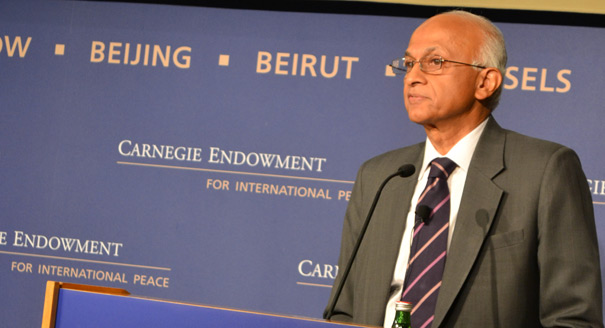Registration
You will receive an email confirming your registration.
The U.S.-India bilateral relationship has witnessed a dramatic transformation over the last decade. During President Obama’s second term, there is much room for the two powers to cooperate on issues that range from security to economic development. Indian Foreign Secretary Ranjan Mathai spoke about what India and the United States can do together to move the partnership forward. Carnegie’s Jessica T. Mathews moderated.
Toward a Closer Partnership
- A Big Deal: Mathai credited the 2008 U.S.-India Civil Nuclear Agreement with paving the way toward a true strategic partnership. By resolving India’s controversial place in the global nonproliferation regime, he said, the agreement allows the two countries to appreciate their considerable convergence of interests. Mathai cautioned that subsequent steps forward in the relationship are likely to be less high-profile than the nuclear deal, but important nonetheless.
- Partners, Not Twins: Mathai argued that India and the United States are well on their way to a genuine strategic partnership based on a convergence of mutual interests. He advised policymakers on both sides to remember that Indian and American views may not always align, but that such small differences need not undermine the relationship.
- Mutual Benefits: Sustaining Indian growth is in the best interest of the United States, Mathai said, since it will create a strong economic partner with peaceful and democratic policies in South Asia. India will act based on its own interests, but in so doing, it will advance those of the United States. He added that Indians, likewise, welcome an active U.S. presence as a guarantor of stability and an open regional architecture.
Shared Strategic Interests
Mathai identified a wide range of regional and global concerns on which Washington and New Delhi could be natural partners.
- Afghanistan After 2014: Mathai highlighted India’s significant contributions to the transition in Afghanistan: Indian troops are working to train their Afghan counterparts, and India is one of the most promising sources of investment in Afghanistan. He explained that history dictates a close Indian interest in a stable Afghanistan, since India witnessed firsthand the dangers of terrorist sanctuaries in that country in the 1990s. To realize the full potential of India’s contributions to Afghanistan’s future, Mathai said, both Washington and New Delhi will have to practice sustained cooperation and candor on the issue.
- Interlocutors With Iran: As the West and the United States look to defuse tensions with Iran, Mathai proposed that India could play an important role. Citing close Indo-Iranian cultural and economic ties, he suggested that India could quietly work to ensure Tehran makes good on its obligations to the international community to forgo a military nuclear program.
- Nurturing Democratic Transitions: Mathai saw common Indian and U.S. priorities in the Middle East, but emphasized that India views external interventions with caution for humanitarian reasons. With Myanmar in the midst of its own transition from autocracy, Mathai welcomed increased American dialogue with Naypyidaw and said that India would continue its own engagement.
“Habits of Cooperation”
In the U.S.-Indian bilateral relationship, Mathai pointed to several fields in which the two sides have made good progress. He argued that the next step is to cement those “habits of cooperation” with close and frequent engagement at the highest levels of government.
- Defense: The United States remains India’s biggest partner in military exercises, and defense trade between the two nations is steadily growing. Mathai suggested that Washington and New Delhi work to further increase their armed forces’ interoperability and remove unnecessary regulatory barriers that have hamstrung meaningful cooperation on defense trade and technology development.
- Trade: While India has repealed many of its most extreme protectionist policies, Mathai acknowledged that India must make good on its second- and third-generation reforms if it is to attract more American businesses; he called for continued work on a bilateral investment treaty. Nevertheless, he added, economic activity between the two countries is thriving, especially in sectors such as aviation, retail, and finance.
- Energy: Powering its booming economy and growing the middle class presents New Delhi with a “vital and difficult” task, Mathai said, and the United States is well positioned to help India move toward a more sustainable energy future. He encouraged increased collaboration on hydrocarbon, biofuel, and grid management technologies.
